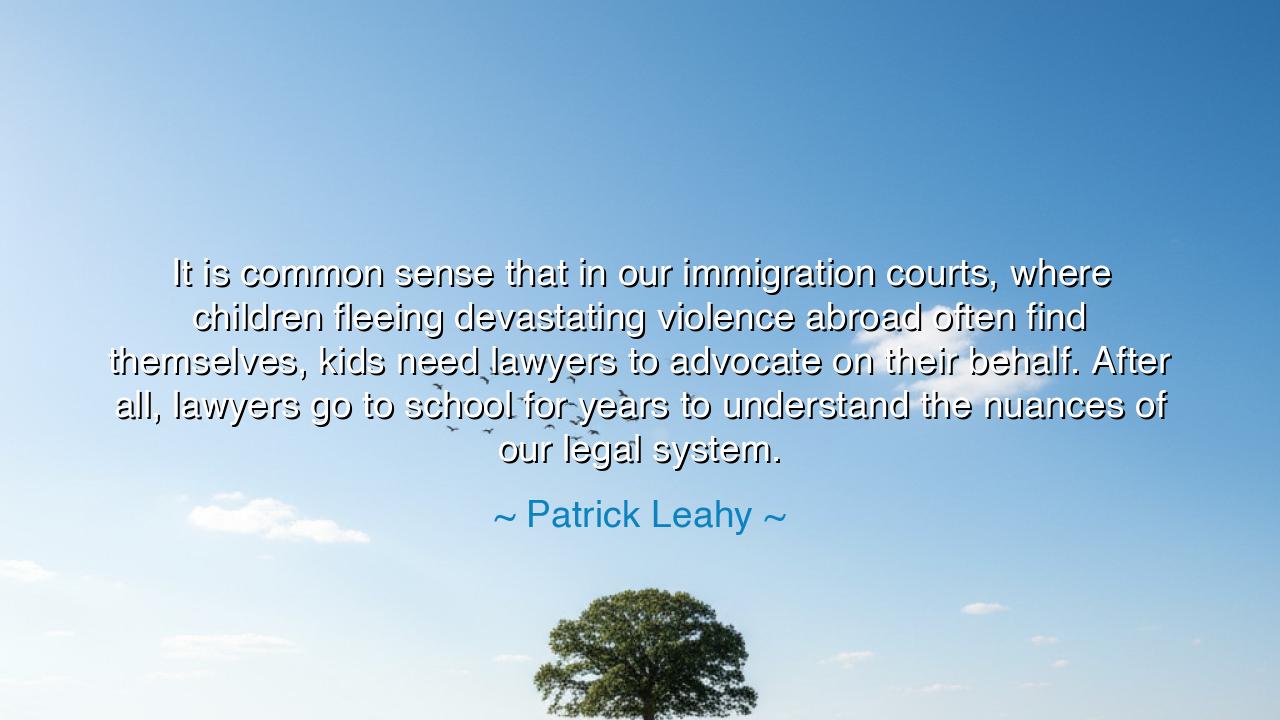
It is common sense that in our immigration courts, where children
It is common sense that in our immigration courts, where children fleeing devastating violence abroad often find themselves, kids need lawyers to advocate on their behalf. After all, lawyers go to school for years to understand the nuances of our legal system.






"It is common sense that in our immigration courts, where children fleeing devastating violence abroad often find themselves, kids need lawyers to advocate on their behalf. After all, lawyers go to school for years to understand the nuances of our legal system." Thus spoke Patrick Leahy, a long-serving voice in the halls of American governance, reminding us of a truth so simple, yet so often denied: that the most vulnerable, especially children, must not be left to stand alone before the crushing weight of the law. His words rise like a call to conscience, declaring that common sense and justice demand more than procedure—they demand compassion, protection, and advocacy.
The origin of this wisdom lies in the deep complexity of the legal system, a labyrinth crafted by centuries of statutes, precedents, and interpretations. Even adults, schooled and fluent in their own tongue, tremble at its intricacies when accused or summoned before a judge. How much more, then, for a child—foreign, frightened, often alone—who has crossed deserts and borders to flee violence? To expect such a one to navigate the law without guidance is not only cruel but absurd. Leahy reminds us that lawyers, trained in the subtleties and struggles of justice, exist for this very reason: to speak where the weak cannot, to shield where the small are exposed.
History has shown us the perils of denying counsel to the vulnerable. In the early days of industrial America, children were often dragged before labor courts or petty tribunals without representation, punished harshly for acts born not of malice but of poverty. It was only after reformers like Jane Addams and others spoke against such injustice that child advocacy in courts began to take shape. Just as the child laborer once needed a voice against the mills and factories, so too do today’s immigrant children need voices against the machinery of immigration courts. Without such voices, justice becomes nothing but punishment disguised.
Consider the story of a twelve-year-old boy who fled Central America, escaping gangs who threatened to kill him if he refused to join. Arriving at the U.S. border, he was placed in removal proceedings, expected to face a trained government attorney before a judge who demanded legal argument. Without a lawyer, the boy could barely speak, let alone defend his right to live. His case illustrates the stark imbalance: the state, with all its power, arrayed against a child with nothing but fear. This is the tragedy Leahy’s words seek to prevent.
There is also in his statement a recognition of duty. A society that calls itself just must measure itself not by how it treats the strong, but by how it shelters the weak. To deny children lawyers in immigration courts is to strip away even the illusion of fairness. It is to cast them into battle without armor, to demand they defend their lives in a language and system they cannot possibly comprehend. Injustice is most dangerous when it hides behind legal formality, pretending to be order while crushing mercy.
The lesson is clear: justice without advocacy is no justice at all. Children, by their nature, require guardians. The law, by its nature, requires interpreters. To bring these two truths together is not radical, but simple common sense. If we ignore this, we risk not only harming innocent lives but staining the very integrity of the system we claim to uphold. For a law that fails the vulnerable is a law that fails all.
What practical steps must we take? Support reforms that guarantee legal representation for all children in immigration courts. Demand that governments allocate resources not only for enforcement but for defense. Offer aid through legal aid societies, community organizations, and personal support for families caught in this struggle. And in daily life, speak out when others dismiss these children as numbers or burdens—remind them that they are human beings, fleeing violence, deserving of the same dignity we would demand for our own sons and daughters.
So let Patrick Leahy’s words be remembered: children cannot defend themselves before the law—therefore we must defend them. Let no nation that calls itself free forget this truth. For when we give voice to the voiceless and shield to the defenseless, we are not merely helping them—we are preserving the soul of justice itself.






AAdministratorAdministrator
Welcome, honored guests. Please leave a comment, we will respond soon